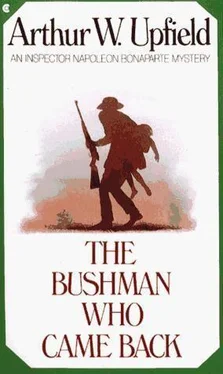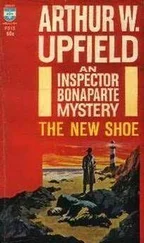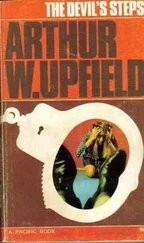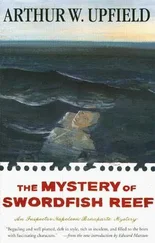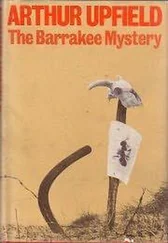Arthur Upfield - The bushman who came back
Здесь есть возможность читать онлайн «Arthur Upfield - The bushman who came back» весь текст электронной книги совершенно бесплатно (целиком полную версию без сокращений). В некоторых случаях можно слушать аудио, скачать через торрент в формате fb2 и присутствует краткое содержание. Жанр: Классический детектив, на английском языке. Описание произведения, (предисловие) а так же отзывы посетителей доступны на портале библиотеки ЛибКат.
- Название:The bushman who came back
- Автор:
- Жанр:
- Год:неизвестен
- ISBN:нет данных
- Рейтинг книги:4 / 5. Голосов: 1
-
Избранное:Добавить в избранное
- Отзывы:
-
Ваша оценка:
- 80
- 1
- 2
- 3
- 4
- 5
The bushman who came back: краткое содержание, описание и аннотация
Предлагаем к чтению аннотацию, описание, краткое содержание или предисловие (зависит от того, что написал сам автор книги «The bushman who came back»). Если вы не нашли необходимую информацию о книге — напишите в комментариях, мы постараемся отыскать её.
The bushman who came back — читать онлайн бесплатно полную книгу (весь текст) целиком
Ниже представлен текст книги, разбитый по страницам. Система сохранения места последней прочитанной страницы, позволяет с удобством читать онлайн бесплатно книгу «The bushman who came back», без необходимости каждый раз заново искать на чём Вы остановились. Поставьте закладку, и сможете в любой момент перейти на страницу, на которой закончили чтение.
Интервал:
Закладка:
“You’d get me into jail for cruelty to dumb animals. No. Best thing is kerosene. I’ve a hold-all in this bag with some strong thread.”
The wound was ugly to behold. Bony persuaded Charlie to sit on a case with his face in his hands to protect his eyes, his elbows on his knees. The parted scalp was lacerated along the edges, glued to the skull with sand, and at least four inches long. Water inside the hut was now limited to a couple of pints, and it was a long time until day broke, when, Bony was confident, he could go to the well.
Fortunately for Charlie, the hold-all contained a couple of darning needles, and, having threaded these, Bony dropped them and the thread into a tin containing kerosene. To distract the patient’s attention, he mentioned having seen the dingo out on the mud.
“Funny thing about them dingoes,” Charlie said, not flinching as Bony sponged the open wound with kerosene. “Reckon they go right across the lake to the other side. I seen a bitch with her pups once. They were coming in, the old gal and four beaut pups. Looked gold in the earlymornin ’. You know, like four baby suns and one big one. I watched ’em. Seen the pups was keeping close to the mother, andd’you know why?”
“Why?” said Bony fitting a piece of leather into the palm of his hand to drive the needle. “This is going to hurt me more than it will hurt you,” he thought, but didn’t say.
“They wasfollowin ’ a pad,” replied Charlie, and moved not a fraction as the needle pierced the lip of the parted scalp. “Them dingoes know their way across. They follow their own roads across the mud. The pups waskeepin ’ closeso’s not to muddy their feet. I could see the track they was following. I went down to the dog pad and walked out a bit to meet the dingo and her pups and see what they do. And they just turned round and went out again, still following the pad. How’s the sewing?”
“Halfway through,” encouraged Bony. “How old would you say the pups were?”
“ ’Bout five weeks, might be six.”
“She couldn’t have brought them across the lake from the other side. She must have taken them out from your side for a walk?”
“Don’t think. She didn’t go out on the pad she was coming in on. No fresh tracks telling it, anyway.”
“How far did you go out on the path?”
“Couple of hundred feet. Could have gone a bit more, but I knew I wouldn’t catch up with them pups.”
“Many such pads?”
“No. That one’s half a mile this side of the homestead.”
“Interesting,” drawled Bony. “Well, the job’s done. Here’s a rag to wipe your eyes clear. You’ll have to get someone to cut the stitches in about a week, if you’re not dead from tetanus.”
Chapter Fifteen
Boards and Dingo Roads
THEWINDclawed the iron roof and now and then shook even the walls. The two men slept fitfully, Charlie tautened by the proximity of the wild aborigines outside, and Bony beset by recent events, plus the need for sleep in a comfortable bed.
Eventually morning came, to reveal several holes in the roof, and crevices about the door frame and under the eaves.
By standing on a case or the bunk, Bony was able to survey the surrounding scene. The wind continued high but had moved to the south, was noticeably cool, and no longer possessed the power to lift dust and move sand dunes. There was no sign of Charlie’s pursuers.
“I’ll fetch water,” said Bony. “Let me out and wedge the door until I return.”
He picked up a petrol tin bucket, thrust cartridges into a pocket and the automatic into another, and removed the wedge. The door swung inward. His hand was moving towards Charlie, in the act of tossing the board to him, when a projecting piece of metal halted the movement.
The board was about two feet long, and seven or eight inches wide. One end was curved to a blunt point, and the original sharp edge along one side had been rasped to smoothness. Across the width and at about one-third from the square end was screwed a wooden cleat, and at equidistance from both ends holes had been bored close to the edge of both sides.
Setting down the bucket, Bony examined the board more closely, and failed to discern its use since it had formed part of a packing-case. “Charlie,” he called, “what do you make of this? Part of a camel saddle, or what?”
On looking up at the aborigine, he found him staring at a point above his head, his face registering expression of dawning comprehension. Only for a moment was reaction to the board evident, then it gave place to one of vacuity, and the shutters fell behind the black eyes.
“Dunno, Inspector Bonaparte,” replied Charlie, the title and surname slipping into the reply unnecessarily. “Bit of ole wood belonging Yorky, looks like.”
“Obviously, as it’s Yorky’s camp. Seen anything like it before?”
Charlie shook his head, and Bony again picked up the bucket, motioned to the opened door, passed outside and heard the door being wedged again.
It was not a time for cogitation. The barren dunes could sprout black figures and discharge a flight of spears. From behind five or six tough mulga trees could step other black men, each with a spear ready to throw. Without haste, or caution, Bony walked the hundred yards to the windmill over the well, where he released the brake to set the mill working to raise fresh water. Casually he leaned against one of the iron legs and scanned the wind-swept, arid surroundings about the mill and the hut. Nothing human appeared, to relieve the depressing scene.
He carried the filled bucket to the hut, and when Charlie opened the door the change of wind proved that the wide iron chimney could smoke.
“Are you firing the place?” Bony asked. And Charlie laughed too loudly before explaining that the fire wasn’t properly blazing. He had started it with brush, and, as he spoke, it burst into flame.
“No blackfellers outside,” Bony told him. “Looks like they cleared out.”
“Too right. They don’t like fight with big-feller policeman. Could be they tell Canute to do his own dirty work, the black bastard. What’ll we do now?”
“Use that basin to wash in, have a shave, push on to the homestead. We’ll follow the beach, to reduce chances of ambush. And you’ll be staying close to the homestead while I argue it out with Canute.”
Charlie was decidedly relieved by Bony’s cheerfulness. He tossed the case board into the fire, added more fuel to surround the billy with flame, and within thirty minutes they had eaten breakfast, rolled cigarettes, and Bony had brought in the horses. To add importance to the big-feller policeman for unseen eyes, assuming the wild men were watching, they moved off with Charlie haltered by a length of camel nose-line and walking beside Bony’s hack as though a prisoner of the Law, white man’s ruddy law.
Even Charlie, so close to the primitive, so close to ‘nature’, failed to sense any nearness of warlike aborigines. As the sun lifted from the horizon, the wind weakened to become a gentle breeze, and the flies kept to the shelter provided by the horses. At noon all the magic of this Earth achieved by the mirage had banished the ugliness of the previous day.
Now and then Charlie chatted, but mostly he walked silently, repeatedly glancing to the rear and even more often directing his gaze to left-ahead, at the shore line of the dunes. Morning passed. A fire and tea and tinned meat separated the morning from the afternoon, and two hours later they sighted the line of pine trees marking the position of the homestead.
“What about the dog pad you were going to show me, Charlie?” asked Bony, and Charlie chuckled and said it was three miles farther on.
Why had the shutters fallen behind his eyes when asked about that case board? Why the dawn of comprehension which had preceded the shutters? What had that board told this aborigine? That the board had brought his mind to understand what he hadn’t understood was amply proved. The trick of shuttering the mind without closing the eyes was ever annoying to the questioner, because it was a more emphatic refusal to answer a question than any words could be.
Читать дальшеИнтервал:
Закладка:
Похожие книги на «The bushman who came back»
Представляем Вашему вниманию похожие книги на «The bushman who came back» списком для выбора. Мы отобрали схожую по названию и смыслу литературу в надежде предоставить читателям больше вариантов отыскать новые, интересные, ещё непрочитанные произведения.
Обсуждение, отзывы о книге «The bushman who came back» и просто собственные мнения читателей. Оставьте ваши комментарии, напишите, что Вы думаете о произведении, его смысле или главных героях. Укажите что конкретно понравилось, а что нет, и почему Вы так считаете.
